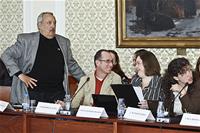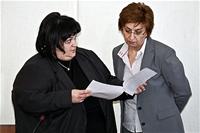Who is afraid of e-voting
Ralitsa Kovacheva, April 26, 2010
 The temporary parliamentary Commission for a new Electoral Code has been working for four months now. So far, however, there is nothing on paper. This makes it slightly impossible for the Members of the Bulgarian Parliament to meet their own deadline - the end of June to finish the draft. If they manage to succeed, this will be a positive sign in two directions - first, that the ruling party Citizens for European Development of Bulgaria(CEDB or GERB) fulfills its pre election promises and second - that the vicious practice from previous years to change electoral legislation in the eve of voting is over.
The temporary parliamentary Commission for a new Electoral Code has been working for four months now. So far, however, there is nothing on paper. This makes it slightly impossible for the Members of the Bulgarian Parliament to meet their own deadline - the end of June to finish the draft. If they manage to succeed, this will be a positive sign in two directions - first, that the ruling party Citizens for European Development of Bulgaria(CEDB or GERB) fulfills its pre election promises and second - that the vicious practice from previous years to change electoral legislation in the eve of voting is over.
After all this is the purpose of the Electoral Code: its rules to be applied for all types of elections and not be changed by every subsequent ruling majority. There are however serious risks in adopting such an important legislation swiftly and under the pressure of deadlines, because in the Electoral Code draft the MPs must answer several essential questions: what will the type of the election system be for the different elections, whether there will be a permanent electoral administration and, especially - a Central Electoral Committee - one for parliamentary and one for municipal elections, how the voting abroad will be organized or for local elections, how the registration of parties and coalitions for their participation in elections should be organised, who will be responsible for (to whom) challenges of the election results, will there be electronic voting (through the Internet).
In a search of answers I will start backwards, because till now only the answer of the last question seems clear. And it is negative. The verbatim reports from the temporary committee sessions show, that the discussion about e-voting started from a fundamentally wrong perspective: as an argument against it the possibility of controlling the vote is being highlighted. And that, as we all know, exists even now in its most ugly forms, so the logic should be legislators to think about how to eradicate this vicious practice in general, rather then deny e-voting as being more risky.
The Blue coalition (uniting the Union of the Democratic Forces and the Democrats for Strong Bulgaria) is the only parliamentary group which is strongly in favor of e-voting. The same position is shared by the Greens,who are not represented in Parliament, and NMSS, who think that this is the only way to attract young people and Bulgarians living abroad to vote. A strong supporter of e-voting on the Internet is also the civil organization Voting Without Borders. It appeared spontaneously during the pre-election campaign last year and proposed e-voting and consolidation of the electoral districts as a way to facilitate and promote the vote abroad.
The proposal of Voting Without Borders, in their own words, is based on the  model of professor Michail Konstantinov and on previous drafts. Briefly, it provides voting through pin codes, issued by the administration. Everyone who wants to vote online receives personally a pin code and gets registered. The administration prepares lists of all people willing to vote online. A voting period gets opened before the Election Day itself. It is a matter of personal choice whether you will decide to vote once online and once - by going to the ballot box. If that happens the electronic ballot could be destroyed without been opened and only the paper ballot to be counted.
model of professor Michail Konstantinov and on previous drafts. Briefly, it provides voting through pin codes, issued by the administration. Everyone who wants to vote online receives personally a pin code and gets registered. The administration prepares lists of all people willing to vote online. A voting period gets opened before the Election Day itself. It is a matter of personal choice whether you will decide to vote once online and once - by going to the ballot box. If that happens the electronic ballot could be destroyed without been opened and only the paper ballot to be counted.
Voting Without Borders presented their idea before legislators, who didn't discuss it in essence and the opposition didn’t save ironic comments. The socialist Maya Manolova (Coalition for Bulgaria) says: "I can predict, having in mind the problems in the current electoral process in Bulgaria that some municipalities will have a mayor elected a few days before the Election Day.” Which is practically impossible, because all the ballots, no matter if they are submitted online or not will be opened on Election Day.
According to Remzi Osman (Movement for Rights and Freedoms, MRF, also known as the party representing the Turkish minority in Bulgaria)) the security of e-voting is not guaranteed: “We see that there are people who can drain other people's bank accounts. We see them hacking websites, protected state websites. These problems exist." Valentina Ivanova from Voting Without Borders explains: ”Yes, there are internet frauds, but they are mostly possible because of illiteracy. It is a matter of an awareness campaign to explain the simple mechanisms of prevention. And they are easy to understand even for kids.”
In fact, even before the hearing of Voting Without Borders, the Committee appeared to have already discussed e-voting in details and it seems it has already made its mind about it. Professor Michail Konstantinov, an election expert, concludes: “I think Bulgaria can rank well ahead in the innovation of manipulating vote. We are the first. We will not only teach the West how to steal from ATMs, but now we can teach them how to steal votes.” He commented that at this stage e-voting is risky.
This opinion is quite convenient for the left, who took the hypocritical position “generally we are in favor, but not here and not now”. To support e-voting “Coalition for Bulgaria” said it wanted guarantees that it will not reinforce controlling of votes. And as we all know, such guarantees cannot be given by anyone, because even currently manipulation of vote can happen on the way to the ballot box.
"With all the paradox of what I am going to tell you, we from Coalition for Bulgaria support e-voting, because in general we are not against enabling more people to participate in elections, but our personal view is that this should happen only when the vote can be protected from being controlled." (M. Manolova)
MRF at least has an honest and straightforward position: they are strongly against e-voting, arguing it can bring real and serious threat of an increase of controlled vote. As Cetin Kazak says: "We have always defended consistent positions as we, together with the Socialists, have been participating in the electoral process for a very long time, we have the richest experience of what is good and what is not.”
 Ekateryna Mihaylova from the Blue Coalition is the only one that noted the generally wrong approach in the discussion about electronic voting: "We should seek mechanisms to stop controlling of vote, rather than reject a way of voting, just because it may lead to controlled vote. It has been the practice so far, hasn’t it?! We talk about vote trade and vote-controlling all the time. And yet there was no electronic voting. Then let’s stop voting, to prevent controlling of vote? "
Ekateryna Mihaylova from the Blue Coalition is the only one that noted the generally wrong approach in the discussion about electronic voting: "We should seek mechanisms to stop controlling of vote, rather than reject a way of voting, just because it may lead to controlled vote. It has been the practice so far, hasn’t it?! We talk about vote trade and vote-controlling all the time. And yet there was no electronic voting. Then let’s stop voting, to prevent controlling of vote? "
The position of the Blue Coalition is to accept a decision in principle in support of e-voting and to continue to work on how to make it safer. CEDB (GERB) offered a compromise: a "pilot" e-voting to be organised not in Bulgaria but abroad, in order to see and analyze the problems.
Hence what is clear so far is that in order to find answers the right questions should be asked first. Who will benefit from denying e-voting: the status quo and the political class, which fortified itself in power for years, at the expense of serious compromises with the will of voters. It is clear that controlled voting and vote trade can exist only in the so called vulnerable groups: illiterate, unemployed, poor people. The only people who can stand against vicious practices and neutralize them are young, educated and socially active Bulgarians, willing to help the system change, many of whom (understandably) live abroad. They study, work, do their shopping, banking online and see no reason not to be able to vote online.
And the reason is actually only one: fear of change. And that change is vital.